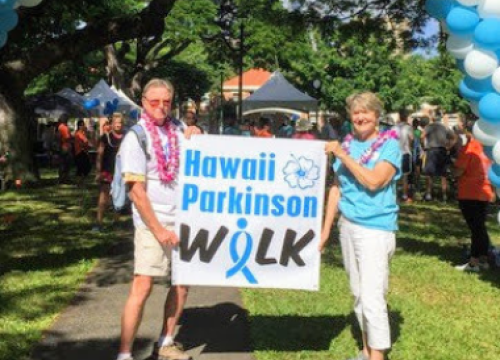Your Role on the Care Team
💡 Quick Summary
-
Care partners play a vital role on the Parkinson’s care team.
-
Care partners observe changes in motor function, mood and daily living and share their insights with healthcare professionals.
-
Open communication between you, your loved one and their care team is essential for high-quality care.
-
Care partners also support hospital visits by helping manage medications and advocating for needs. They can plan ahead with resources like advance directives, HIPAA waivers and the Parkinson’s Foundation Hospital Safety Guide.

As your loved one’s care partner, you play a vital role on their care team. You likely spend more time with your loved one with Parkinson’s disease (PD) than anyone else, so you are the most likely to notice subtle changes over time.
You already use these observations to help your loved one in the moment, but you should also share these insights with the care team — especially regarding motor function (how your loved one moves) and mood (how your loved one feels).
The person with Parkinson's may not always be aware of these subtle changes, but even if they are, their understanding of health risks (such as falling) may not have caught up to their level of risk and impairment.
Professionals on the Care Team
It is important to have a good understanding of the different types of professionals who may be able to provide help and guidance along your Parkinson’s journey together.
It takes more than a neurologist or movement disorders specialist (a neurologist with specialized training) to manage PD. Your loved one will most likely build their care team over time. Healthcare specialists can communicate with each other regarding care, and take more of a team approach or at least keep one another informed.
Who is part of a PD care team? The PD doctor will likely be your main point of contact, but PD specialists can include:
- Neurologist (preferably a movement disorders specialist)
- Nurse practitioner or physician assistant
- Nurse
- Physical therapist
- Occupational therapist
- Speech-language pathologist
- Social worker
- Nutritionist or registered dietician
- Mental health professional
Open, honest communication between you, your loved one and the healthcare team is crucial. While you depend on health professionals for high-quality care, they depend on you for information about your loved one’s health status and living experience, and for properly carrying out professional advice.
Discover the Care Team
Learn more about the specialists who can help you or your loved one manage Parkinson’s symptoms. Use our search tool to find expert PD care near you!
Finding the Right Care
Finding a specialist can seem like a daunting task, but it doesn’t have to be. The Parkinson’s Foundation can help guide you.
- Find a medical center that provides expert care near you
- Contact our Helpline at 1-800-4PD-INFO (1-800-473-4636) or Helpline@Parkinson.org for a referral
- Ask your primary care physician for a referral
- Contact your insurance provider for a list of specialists in your network
- Seek referrals from other people living with Parkinson's
Resources
These organizations can also help you find qualified healthcare professionals:
- Aging Life Care Association: 520-881-8008
- Find a Therapist
- Visiting Nurse Associations of America
- Find a Physical Therapist: Use the search feature to find a therapist with a specialty in geriatric or neurological rehabilitation.
- Find a Speech-Language Pathologist
- Find a LSVT-Certified Clinician
Engage the Healthcare Team
It is worthwhile to get to know all the members of the care team caring for your loved one, as they can teach you how to provide proper care. As the disease and symptoms progress, this will become particularly important.
Ask questions about what you could or should be doing to care for both your loved one and yourself. If the person with Parkinson’s is hospitalized or receives therapy at a rehab facility, ask the staff to show you proper caregiving techniques for tasks like lifting, transfers and bathing. Learning basic skills will build your confidence in the role of physical caregiving.
Explore More: Preparing for a Medical Appointment
Your Role in the Hospital
Hospital stays can be stressful, especially with Parkinson’s, which often involves managing complex symptoms and timely medication schedules. While in the hospital, your loved one with Parkinson’s may be unable to communicate as well as usual. As a care partner, try to ensure that you or someone you trust is with your loved one to help listen to treatment instructions, make sure their medication schedule is being followed and help communicate their needs.
We recommend that you have a plan and talk with family and friends about this before an emergency situation occurs. Some families find that including an adult child, sibling or close friend who can step into the “hospital care partner” role, especially if they have medical training, instead of the primary care partner. Confirming how others can help in an emergency will bring you and your loved comfort in a time of chaos.
Setting Hospital Care Partners Up for Success
For the hospital care partner to successfully support and advocate for a loved one in the hospital, be sure that any required documents are signed in advance to ensure you can speak on their behalf.
Advance Directives are legal documents that contain your medical care preferences in case you are unable to communicate your wishes.
- A HIPPA Waiver is a legal document that will allow your hospital care partner to access your medical information. Learn more and start the process on our Planned Ahead page.
- A Medical Power of Attorney is a legal form prepared by an attorney in advance of a health crisis. It allows you to appoint an “agent,” also called a healthcare representative or surrogate, to access your medical records, speak to healthcare professionals about your care and make medical decisions on your behalf if you are unable to do so.
Often a healthcare representative is a spouse or family member —someone you trust and who is reachable in an emergency. Your hospital care partner doesn’t need to be your medical power of attorney, but they should know who is so they can contact them as necessary.
Our Hospital Safety Guide includes items to prepare you and your loved one with Parkinson’s for a planned or emergency hospital visit as well as information and reminders for hospital staff.
Related Materials
My Parent Has Parkinson's. What Does It Mean?
Intimacy and PD
Impulse Control
Related Blog Posts

5 Care Partner Tips for Managing Mid-Stride Parkinson’s Symptoms

Caregiver Corner: Tools to Help You Cope
